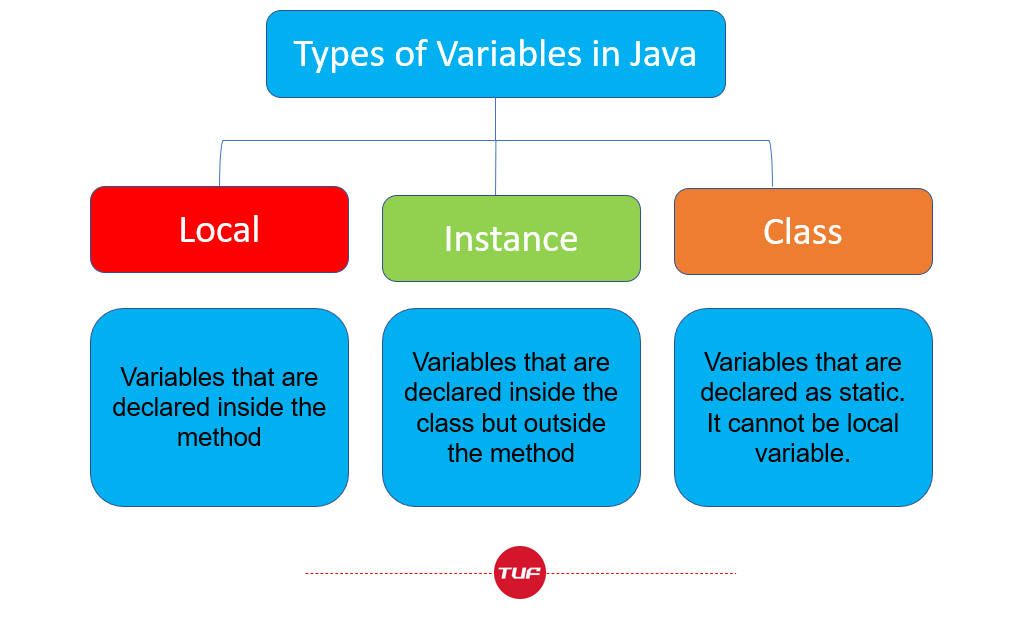Antwort What are local variables in Java? Weitere Antworten – What is a local variable in Java with an example
A local variable is a variable declared inside a method body, block or constructor. It means variable is only accessible inside the method, block or constructor that declared it. Important Note: In java, a block i.e. “area between opening and closing curly brace” defines a scope.Local variable — an auxiliary temporary variable that exists only while a particular function or a block of statements is executed, or. Class variable (or class field — more correct term in Java) — a variable that is present in any object of a class, and whose lifetime is the same as the object lifetime.A global variable is one that is “declared” outside of the functions in a program and can, therefore, be accessed by any of the functions. A local variable is declared inside a specific function and can only be accessed by the function in which it is declared.
What are types of variables in Java : There are three different types of variables in Java, we have listed them as follows:
- Local Variables.
- Instance Variables.
- Static Variables.
What are local variables
In computer science, a local variable is a variable that is given local scope. A local variable reference in the function or block in which it is declared overrides the same variable name in the larger scope.
Why do we use local variables in Java : Local variables are essential whenever we need a temporary variable to store values inside the block but do not need those variables for other functions or the whole class in the programming language java. In such circumstances, we can define the variable as local in java to meet the requirement.
three types
Variables in Java is a data container that saves the data values during Java program execution. There are three types of variables in Java Local variables, static variables, and instance variables.
Local variables are declared within specific blocks of code and have limited scope, existing only within their block. Global variables, declared outside of any function, are accessible from any part of the program and persist throughout its execution.
What is meant by local variable
In computer science, a local variable is a variable that is given local scope. A local variable reference in the function or block in which it is declared overrides the same variable name in the larger scope.An experimental inquiry typically has three main types of variables: an independent variable, a dependent variable and controlled variables.Local variables are useful for test variables in loops and storing locally used, unique values for each entity at the current location. Local variables are used within a block of logic (i.e., operation logic, subroutines) and are declared with an INT or REAL statement.
Answer: The correct answer is (b) stack memory. Local variables as well as function parameters are generally stored in stack memory.
Which is a local variable : Local variables are a specific type of variable that are only available within the context of a particular expression and can only be accessed within the function that defines them. Local variables are useful when you only need that data within a particular expression.
What are the 4 variables in Java : Java Variables
- String – stores text, such as "Hello".
- int – stores integers (whole numbers), without decimals, such as 123 or -123.
- float – stores floating point numbers, with decimals, such as 19.99 or -19.99.
- char – stores single characters, such as 'a' or 'B'.
- boolean – stores values with two states: true or false.
What are 3 differences between a local and a global variable
Key Difference Between Local Variables and Global Variables
Local variables are defined inside a function or block, whereas global variable is defined outside of all functions or blocks. Local variables exist only during the function's executions, while global variables remain in memory for the duration of the program.
You can see that one way to look at variables is to divide them into four different categories ( nominal, ordinal, interval and ratio). These refer to the levels of measure associated with the variables.(The “three variables” are the x, the y, and the z.) The numbers a, b, and c are called the coefficients of the equation. The number r is called the constant of the equation. Examples. 3x + 4y – 7z = 2, -2x + y – z = -6, x – 17z = 4, 4y = 0, and x + y + z = 2 are all linear equations in three variables.
Why do we need local variables in Java : Local variables are essential whenever we need a temporary variable to store values inside the block but do not need those variables for other functions or the whole class in the programming language java. In such circumstances, we can define the variable as local in java to meet the requirement.








